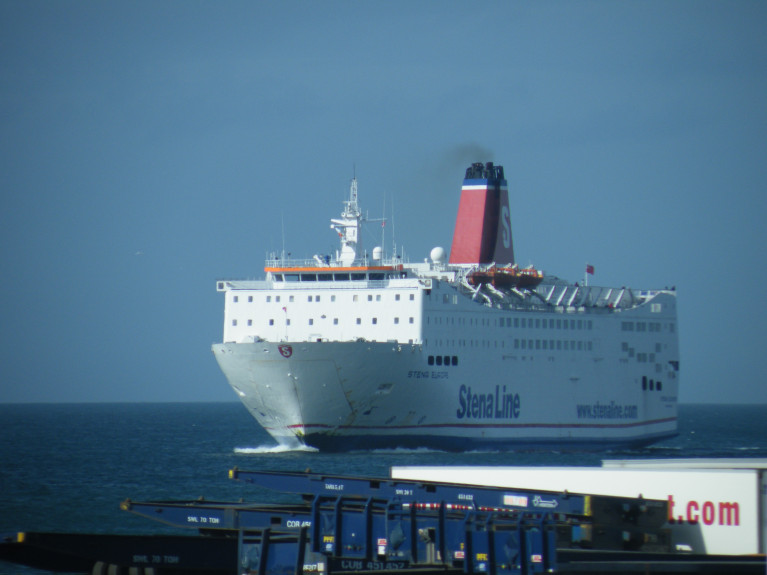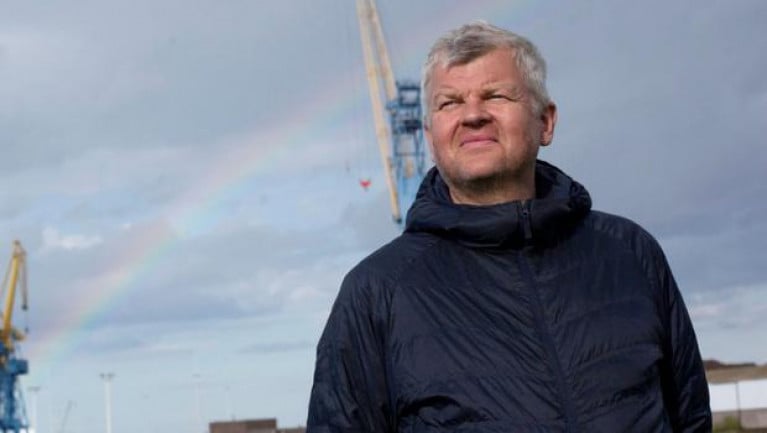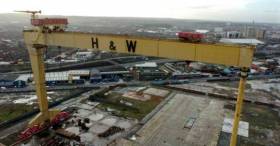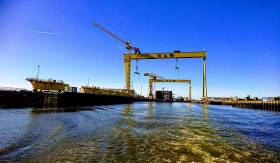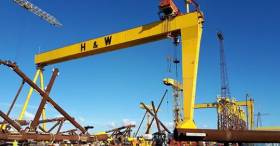Displaying items by tag: H&W shipyard
Rosslare-Fishguard Ferry Sailings Still Suspended
Sailings between Rosslare and Fishguard in south Wales continue to be suspended as the Stena Europe's stay in dry dock is extended to June 4.
As Afloat previously reported, the Irish Sea crossing was temporarily cancelled, initially until May 22.
Stena Line said that it had been decided to send the vessel for repair at the Harland and Wolff shipyard in Belfast, following a routine inspection of the ferry.
It was initially anticipated that the repairs would be completed by May 21 and the ferry back on the run by the 22.
However, the company still has no Irish Sea crossings from Fishguard and (yesterday) confirmed that the Europe's stay in dry dock has been extended.
"Stena Line is continuing to carry out works on the Stena Europe, while travel restrictions with the Republic of Ireland remain in place," said a spokesperson for the company.
"An announcement from the Irish Government is expected (today) Friday, May 28, on Digital Green Certificates and International Travel and Stena Line plans to have the Stena Europe back in service on June 4."
More reports the Western Telegraph here.
In addition earlier today Afloat reported on the Irish Government's position on the Common Travel Area between Ireland and UK.
TV presenter Adrian Chiles will be seen helping to steer a boat into Belfast Harbour and getting behind the controls of a crane in the docks on network television.
The BBC Two programme has an entire episode (3) from 'Our Coast' dedicated to exploring Co Down's shores from Belfast Lough down to Strangford Lough via the Ards Peninsula.
Adrian's journey starts with highlighting the work of Belfast Harbour's pilots - a team of five captains with 150 years of seafaring experience between them - who dock huge vessels safely on a daily basis.
Our Coast: Co Down is to broadcast first on BBC Two (England) tonight (8.30pm), and tomorrow on BBC Two NI (at 11am)
More here from the Belfast Telegraph.
As the Belfast Telegraph writes, the firm which agreed to buy Harland & Wolff has not met an initial deadline to pay part of the purchase price of the iconic Belfast shipyard.
Having paid a £500,000 deposit at the start of October, Infrastrata had a 'soft' target to pay £3.3m yesterday (Friday, 1 Nov.)
A total of 120 jobs were put at risk when Harland & Wolff went into administration in August after the collapse of its Norwegian parent company.
Workers staged a sit-in protest at the shipyard for weeks as part of a campaign to save one of Northern Ireland's biggest names in industry.
Their campaign was brought to an end when Infrastrata announced it would buy it for £6m last month.
A spokesperson for the London-based energy company said they are now aiming for a 'backstop' date of December 31.
The spokesperson cited due diligence and negotiations as the reason for the delay, and stressed there is no cause for concern when it comes to the completion of the purchase.
For more click here to read.
The Belfast shipyard at Harland and Wolff could go bust within days as fears mount over its future, it has emerged.
Unions and sources familiar with ongoing negotiations at the shipyard, reports Belfast Telegraph, have said that the company could "go to the wall" next Wednesday, if a buyer cannot be found.
Around 132 people are understood to be still employed at the operation, which was put up for sale by its Norwegian parent company Fred Olsen Energy in December 2018. The group, now known as Dolphin Drilling ASA, filed for bankruptcy last month.
Talks involving political leaders, economic development agency Invest NI and shipyard management have taken place throughout the week.
It's understood that Newry-based MJM Marine had held the status of an exclusive bidder. Jonathan Guest, who replaced Robert Cooper as chief executive of Harland and Wolff in April 2018, is a former managing director of MJM Marine.
During 2018, MJM used Harland and Wolff's dry dock for carrying out a major cruise contract with Royal Caribbean Cruise Ltd.
For more click here from the story.
Belfast's Iconic Shipyard Cranes Could “End up as Tourist Attractions” If MoD Contracts Go Overseas
#BelfastLough - Belfast's iconic cranes of Samson and Goliath could “end up as tourist attractions” if military shipbuilding contracts are awarded overseas, it has been warned.
As Belfast Live reports the union UNITE made the claim as they launched a Shipbuilding Charter to press for MoD money to be spent at UK shipyards, including Belfast’s Harland & Wolff.
Concerns have been raised about the contracts after the MoD said warships are to be built in the UK for national security reasons, but in a move labelled a “sleight of hand” they are refusing to designate auxiliary and support ships as warships and have sent the contract out to international tender. The move could see the vessels built in Korea or Japan.
Unite Regional Coordinating Officer and lead officer for the shipbuilding industry here, Susan Fitzgerald says it is “crazy” that the vessels are not be designated warships.
She added: “Allowing these ships to be built in the UK would create thousands of jobs and regenerate the skills base. It’s a no brainer for the Government to see that these contracts are awarded here.”
For much more click here and scroll below photo of RFA Fort Victoria berthed at Liverpool landing stage, opposite of (H&W) competiting shipyard of Cammell Laird in Birkenhead.



























